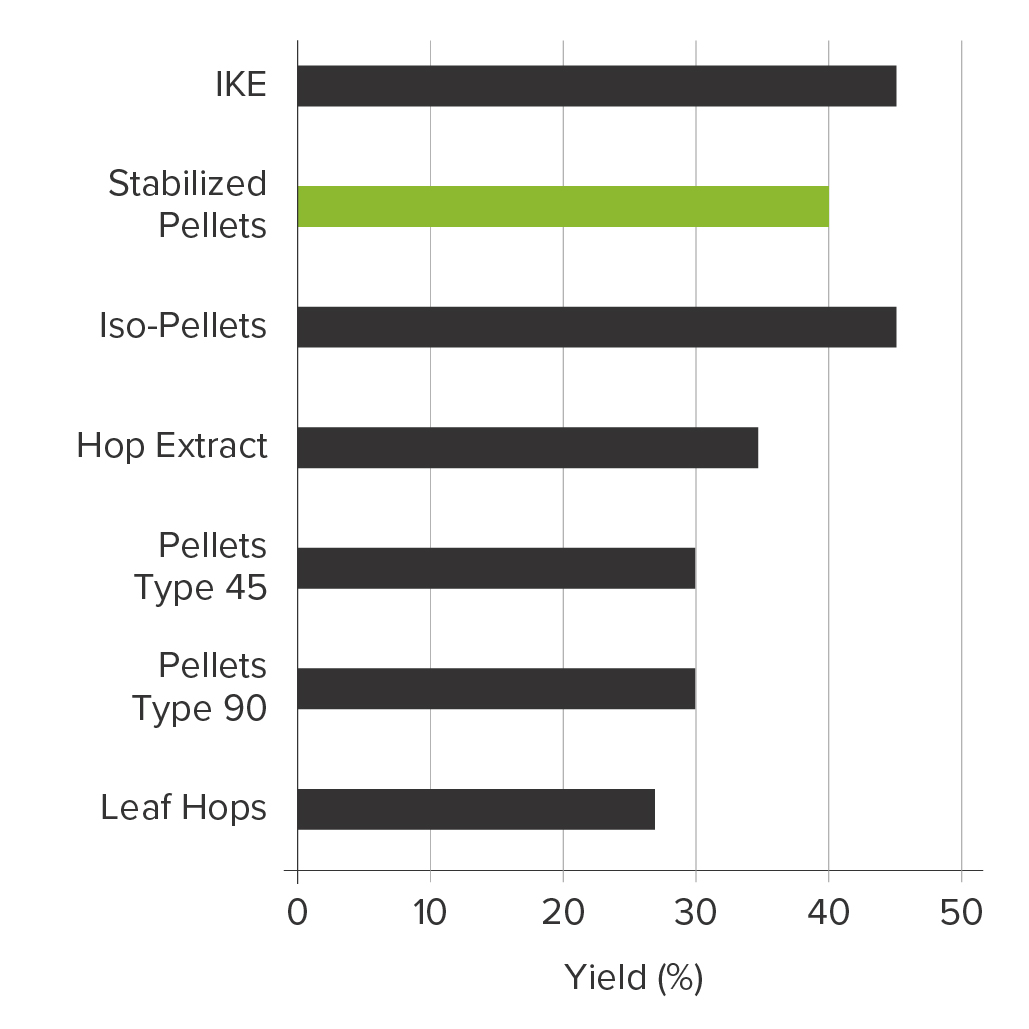
Stabilized Pellets (Type 90 & Type 45)
Overview
Stabilized Pellets are a hop product made from leaf hops, added to the wort kettle during the boiling process. They offer improved utilization of alpha acids due to the presence of excess Mg2+ ions added as MgO during processing.
Stabilized Pellets can replace conventional hop products for bitterness and aroma without impacting beer quality.
Stabilized Pellets exhibit fewer losses in bittering potential compared to standard pellets after prolonged storage.

Specifications
- Short description
- cylindrical hop pellets; mechanically produced from milled leaf hops; stabilized pellets are blended with MgO prior to pelletization
- Alpha acids
- 1 - 25 %
- Beta acids
- 1 - 14 %
- Hop oils
- 0.2 - 7.0 ml/100 g
- Moisture content
- 6 - 9 %
Properties
Appearance
Stabilized Pellets are olive green pellets, approximately 6 mm x 10 - 15 mm in size (diameter x length).
Flavor
Stabilized Pellets produce flavors in beer indistinguishable from those of regular pellets. Stabilized Pellets provide bitterness and aroma to the beer. The flavor depends on the variety, quantity and time of addition. For further information, please refer to the hop variety data sheets.
Utilization
Given as an early kettle addition (up to 15 min after the boil begins), hop utilization normally falls within a range of 38 – 40 %. This higher utilization, compared to standard pellets, is due to the Mg++ ions catalyzing the rapid conversion of alpha acids to iso-alpha acids. When Stabilized Pellets are added late in the boil, utilization can decline to 30 % or less, depending on individual process conditions. Both additions can vary depending on the desired intensity and the beer style.
Standardization
The content of bitter substances in Type 45 Stabilized Pellets can be standardized to specific concentrations during pellet production.
Quality
All Hopsteiner® products are processed in facilities which fulfill internationally recognized quality standards.
Packaging
Our products are delivered in their respective recommended standard packaging. Alternatives may be possible upon customer request.
Standard packages of our processing plants in the USA (US) and Germany (DE) are:
- 5, 10, 90, 140 kg softpack under inert gas in 5-layer aluminum composite foils (DE)
- 20 kg soft pack under inert gas in 5-layer aluminum composite foils (US)
Usage
Dosage
Stabilized Pellets are used in similar ways to standard pellets, contributing bitterness and hop aroma to beer. The quantity of Stabilized Pellets in an addition can be calculated using the alpha acid content of the pellets and an estimated or known utilization. Late kettle additions of Stabilized Pellets (typically 5 – 20 min prior to the end of the boil) reduce alpha acid utilization but increase hop aroma and flavor.
Application
Stabilized Pellets can be added directly to the wort kettle or hop dosing vessel. Alternatively, owing to their free-flowing nature, additions of Stabilized Pellets can be automated. However, measures should be taken to avoid prolonged exposure to air in any bulk handling system.
Storage
The recommended storage temperature in the original unopened packaging is < 5 °C (41 °F).
Short-term, transport-related temperature deviations do not affect product quality.
Best Before Date
Under the recommended storage conditions, the shelf life from the date of production/ packaging is at least 6 years.
Safety
Ensure good ventilation of the workplace and wear personal protective equipment. Avoid contact with eyes and skin. Do not inhale vapors or dusts. For full safety information, please refer to the relevant Hopsteiner® safety data sheet.
Analytical Methods
International approved methods listed in commitees such as ASBC or Analytica-EBC using current standards are applied.
Product analytics
- Analytica-EBC 7.11 (HPLC)
- ASBC Hops-15 (HPLC)
- Analytica-EBC 7.10 (Distillation)
- ASBC Hops-13 (Distillation)
Technical Support
We are pleased to offer assistance and advice on:
- safety data sheets
- support for brewing trials on a pilot or commercial scale
- analytical services and information about analytical procedures
Disclaimer: The information provided in this document is believed to be correct and valid. However, Hopsteiner® does not guarantee that the information provided here is complete or accurate and thus assumes no liability for any consequences resulting from its application.
Last updated: 23/11/2023
Save PDF